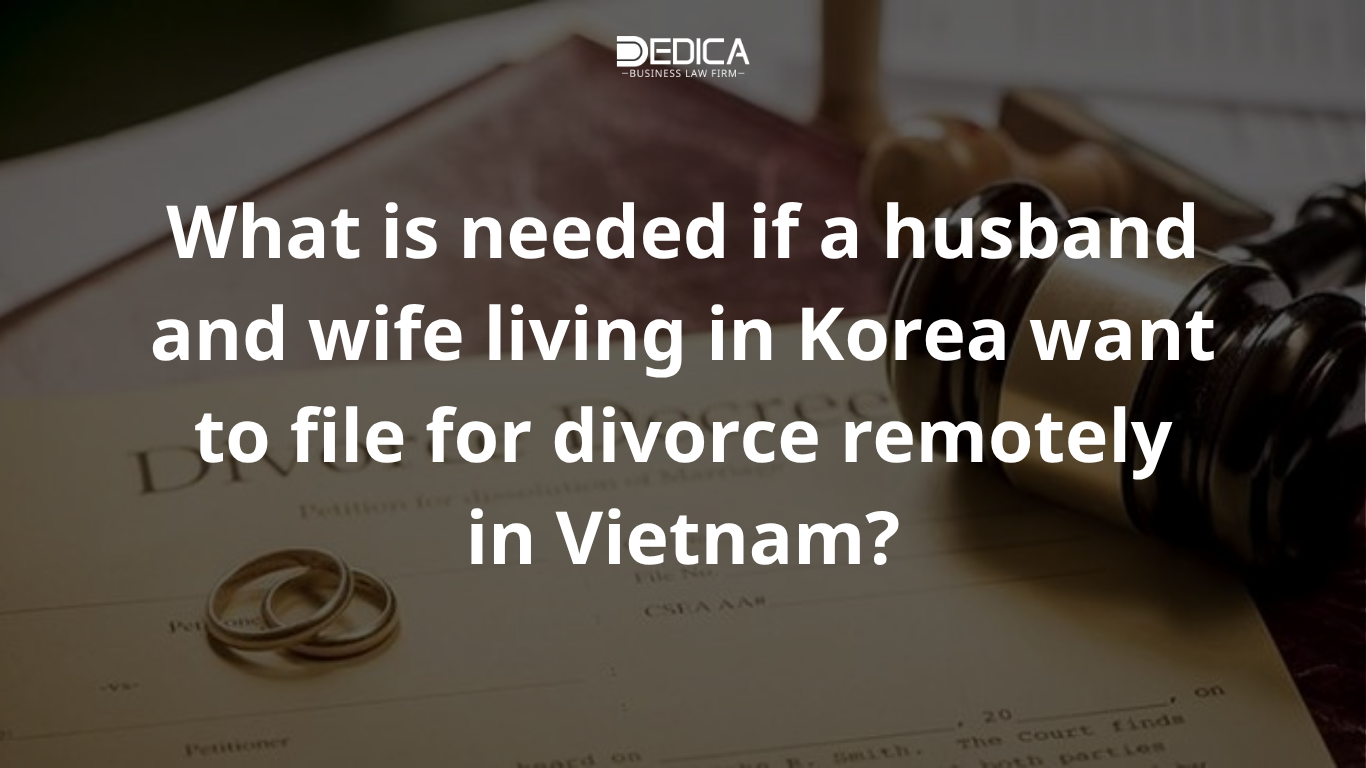No table of contents available
If either the husband or wife is living in South Korea but wishes to file for divorce in Vietnam, remote proceedings are entirely possible. Below is a detailed guide to help you prepare properly and effectively.

Answer:
According to Article 127 of the 2014 Law on Marriage and Family, if one of the spouses is a Vietnamese citizen residing in Vietnam, the Vietnamese court has jurisdiction to resolve divorces involving foreign elements.
If it is a consensual divorce: the case may be filed at the court where either spouse is residing or working in Vietnam.
If it is a unilateral divorce: the petitioner must file the case at the court where the respondent is residing or working in Vietnam. If the respondent no longer resides in Vietnam, the petitioner may file where they themselves reside.
A request for consensual divorce signed by both parties (or a written request to proceed in absence if the party in Korea cannot return to Vietnam)
Original marriage certificate (or annotated version if registered in Korea)
Certified copies of passports or Vietnamese ID cards of both spouses
Certificate of residence or temporary residence card in Vietnam for the Vietnamese spouse, and if available, for the absent spouse as well
Extracted birth certificate for any shared children under 18
Documents related to joint property or debts (if applicable)
Personal statements about the marriage, reasons for divorce, agreement on assets and child custody
Power of attorney allowing a representative in Vietnam to receive court notices and results (if entirely absent from Vietnam)
Note: All documents issued by foreign authorities must be legalized and translated into Vietnamese as per regulations.
Petition for unilateral divorce, including a request for trial in absence if the other spouse in Korea cannot return
Original marriage certificate
Passport/ID and proof of residence of the petitioner, and if available, of the respondent
Information and address of the respondent abroad. If the exact address is unknown, the court must be asked to verify through the immigration department or international consular services
Other relevant documents such as property records, evidence, children’s birth certificates, etc.
Consular legalization and certified translation into Vietnamese, especially for documents issued abroad or if the absent party signed the petition overseas; such documents must be authenticated by the Vietnamese Embassy or Consulate in Korea

Prepare the documents as described above and submit either in person, via registered mail, or online if supported by the local court
Within 7–12 working days, the court will review and accept the application. If qualified, mediation will take place. If successful, the court will issue a decision recognizing the consensual divorce, usually within 20–30 working days from acceptance
File the petition at the competent court according to the residence of the respondent, or of the petitioner if the respondent does not reside in Vietnam
The court will receive, review, and notify the petitioner to pay court fees within about 15 working days
The court will summon both parties. If the respondent is absent the first time, the hearing is postponed; if absent the second time, the case is tried in absentia under Article 228 of the Civil Procedure Code 2015
The first-instance process may take 2–4 months; more complicated cases may take longer
If the divorce was granted in Korea previously, the court judgment must be legalized, translated into Vietnamese, and annotated in the civil status book at the district-level People’s Committee in Vietnam in accordance with Decree 123/2015/NĐ-CP
After annotation, a certificate of single status can be requested for the purpose of registering a new marriage or applying for a passport or residence card
If the foreigner divorces before two years of marriage in Korea and has no shared children, they may be required to leave Korea
If there are shared children, the foreign spouse may apply to stay to care for the child with an appropriate visa, such as F-1-1 or F-5, depending on the case
No need for the absent party to return to Vietnam: both consensual and unilateral divorces can be processed remotely if documents are correctly prepared and consular legalization is completed
Consular legalization and certified Vietnamese translation are mandatory for all documents issued abroad
Provide complete address details of the respondent abroad. If unreachable, the court must be requested to verify via the appropriate authority to avoid dismissal
Legal advice on child custody, support, and property division is essential to protect the interests of the spouse in Vietnam, especially if the other party resides in Korea or holds foreign nationality
When the husband and wife live in Korea and Vietnam respectively, divorce in Vietnam can still proceed remotely with proper procedures, complete documentation, and consular legalization as required by law. Depending on the specific situation—consensual or unilateral—you must prepare transparently, submit full documentation, and may authorize a family member or lawyer in Vietnam to handle and follow up on the case.
📞 Hotline: (+84) 39 969 0012 (Available on WhatsApp, WeChat, and Zalo)
🏢 Head Office: 144 Vo Van Tan Street, Xuan Hoa Ward, Ho Chi Minh City (144 Vo Van Tan Street, Vo Thi Sau Ward, District 3, Ho Chi Minh City)
🕒 Business Hours: Monday – Friday (8:30 AM – 6:00 PM)
Reach out today for a free initial consultation with our team of professional lawyers!

Select a platform to view details